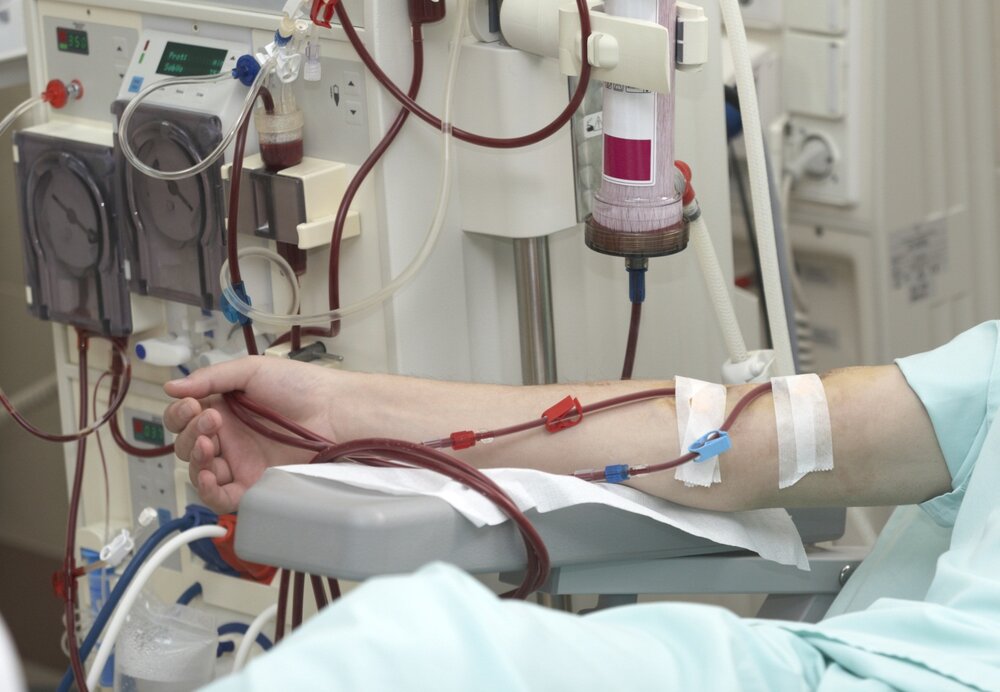Dialysis patients rise annually by 4,000 in Iran: official

TEHRAN – The number of patients in Iran undergoing dialysis for chronic kidney diseases increase by 4000 per year, Mehdi Shadnoosh, the director of the Transplantation Department at the Ministry of Health announced, Tasnim reported on Wednesday.
Tehran Times Health DeskIn this way, some 40,000 dialysis patients will be added to current 32,000 patients over the next decade, he explained.
“No fund can cover and manage such expenses, hence we have two ways: one is transplantation and the other is peritoneal dialysis.”
The health ministry also plans to improve the peritoneal dialysis in the future, he said.
In peritoneal dialysis, a sterile solution containing glucose (called dialysate) is run through a tube into the peritoneal cavity, the abdominal body cavity around the intestine, where the peritoneal membrane acts as a partially permeable membrane.
Although the health ministry is planning for educating people and also prevention, he said.
In late February, Shadnoosh announced that there are around 8,600 people in Iran waiting to receive a kidney transplant. In addition, 15 to 16 thousand patients receive dialysis every day.
He said that every round of dialysis costs around 4.5 million rials (around $107) for the healthcare system.
Kidney transplant and dialysis are free services in Iran, so there must be more focus on teaching people the proper preventive methods such as controlling their high blood pressure and diabetes.
According to the World Health Organization, a study revealed that in 2015, 1.2 million people died from kidney failure, an increase of 32% since 2005.
In 2010, an estimated 2.3–7.1 million people with end-stage kidney disease died without access to chronic dialysis. Additionally, each year, around 1.7 million people are thought to die from acute kidney injury. Overall, therefore, an estimated 5–10 million people die annually from kidney disease.
World Kidney Day 2019: Kidney health for everyone everywhere
The World Kidney Day (WKD), a joint initiative of the International Society of Nephrology (ISN) and the International Federation of Kidney Foundations (IFKF), is celebrated annually on March 14.
The theme of 2019 for World Kidney Day is ‘kidney health for everyone everywhere’.
According to worldkidneyday.org, 850 million people worldwide are now estimated to have kidney diseases from various causes. Chronic kidney diseases (CKD) cause at least 2.4 million deaths per year and are now the 6th fastest growing cause of death.
Acute kidney injury (AKI), an important driver of CKD, affects over 13 million people worldwide and 85% of these cases are found in low and middle-income countries (LMICs). Around 1.7 people are estimated to die annually because of AKI.
Moreover, CKD and AKI are important contributors to increased morbidity and mortality from other diseases and risk factors including cardiovascular disease, diabetes, hypertension, obesity, as well as infections such as HIV, malaria, tuberculosis, and hepatitis. Furthermore, CKD and AKI in children, not only lead to substantial morbidity and mortality during childhood but also result in medical issues beyond childhood.
This year, World Kidney Day sets out to raise awareness of the high and increasing burden of kidney diseases worldwide and the need for strategies for kidney diseases prevention and management.
Kidney Health for Everyone Everywhere calls for universal health coverage (UHC) for prevention and early treatment of kidney disease.
The ultimate goal of a UHC policy is to promote population health by ensuring universal, sustainable and equitable access to essential healthcare of high quality, protecting people from health impoverishment and improving equity in health across socioeconomic groups.
Specifically, WKD calls on everyone to advocate for concrete measures in every country to improve kidney care:
Encourage and adopt healthy lifestyles (access to clean water, exercise, healthy diet, tobacco control. Many types of kidney diseases can be prevented, delayed or kept under control when appropriate prevention measures are in place.
Make screening for kidney diseases a primary healthcare intervention including access to identification tools (e.g. urine and blood tests). Screening of high-risk individuals and early diagnosis and treatment is cost-effective to prevent or delay end-stage kidney diseases.
Ensure kidney patients receive basic health services they need (e.g. blood pressure and cholesterol control, essential medications) to delay disease progression without suffering financial hardship.
Call for transparent policies governing equitable and sustainable access to advanced health care services (e.g. dialysis and transplantation) and better financial protection (e.g. subsidies) as more resources become available. Breaking down socioeconomic barriers and expanding access to comprehensive services in order to meet the needs of the population is essential to guarantee equitable kidney care and increase quality.
SB/MQ/MG
Leave a Comment